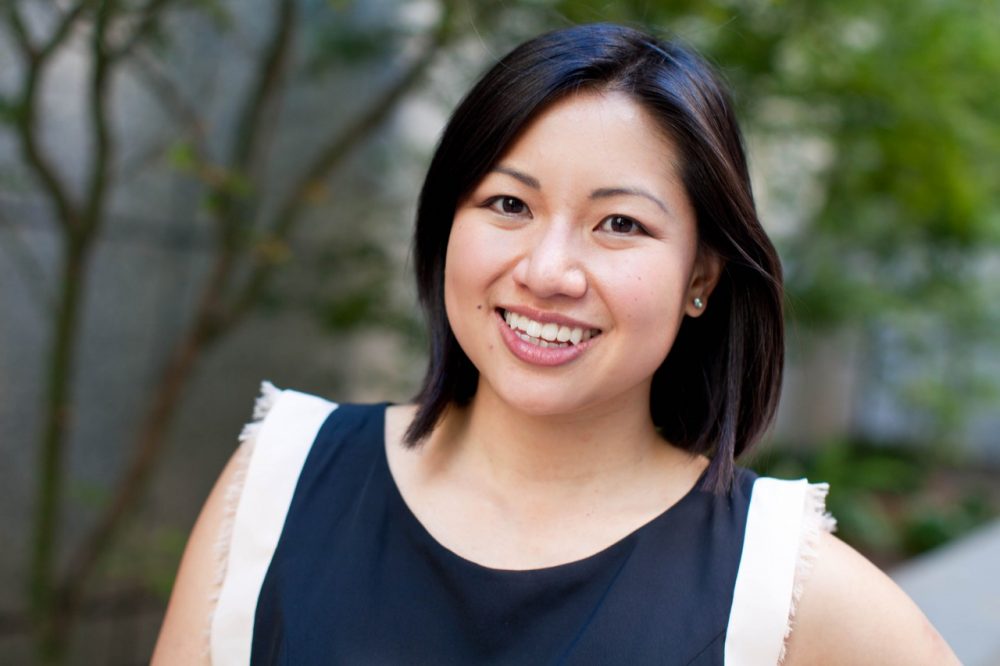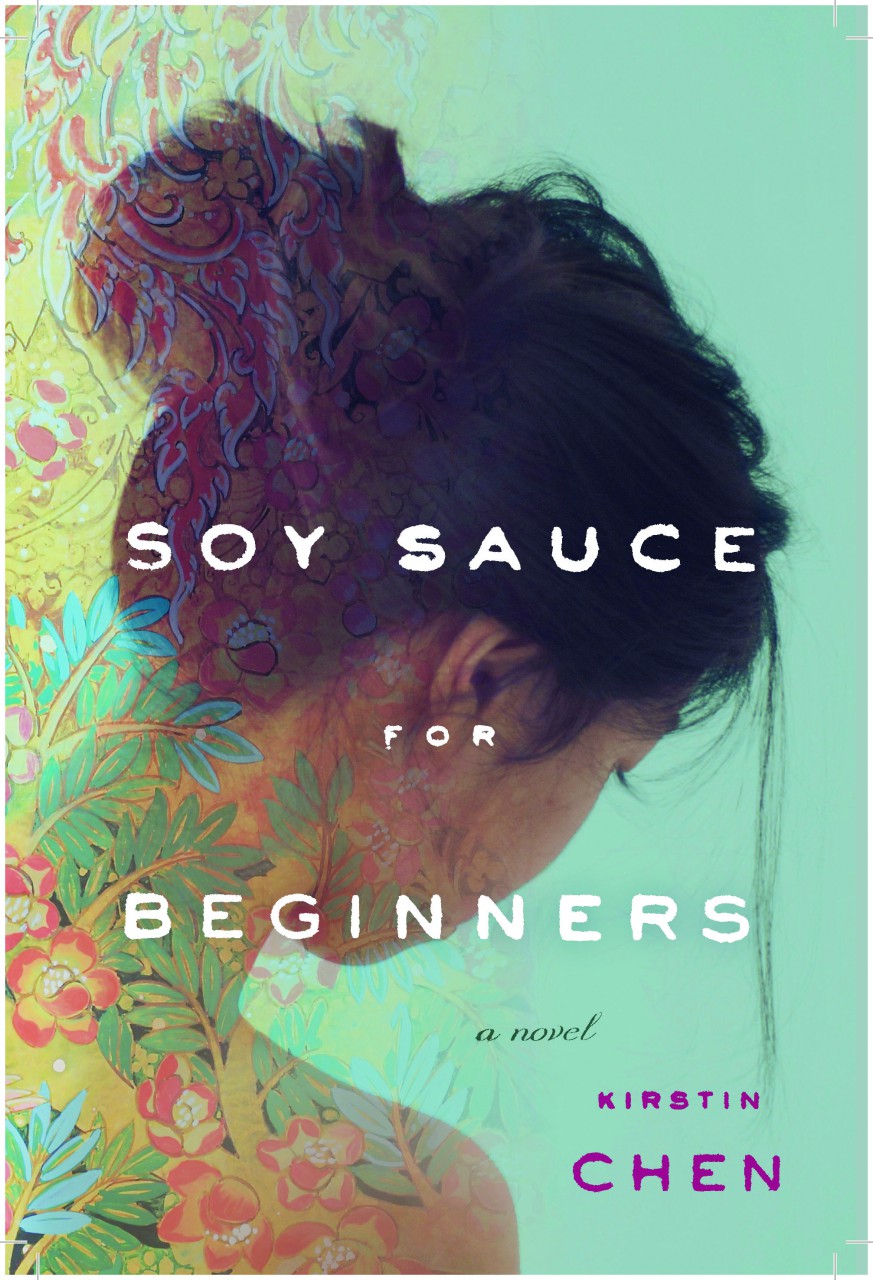Advertisement
Novel Interweaves Family Loyalties, Singapore's Food Scene, Artisanal Soy Sauce

Kirstin Chen's debut novel "Soy Sauce for Beginners" was picked by O Magazine as one of "7 Books That Will Transport You To Another World."
That world is Singapore, where the narrator, 30-year-old year Gretchen, returns to her family's soy sauce business after her marriage in California falls apart.
There are crises at home as well: Gretchen's mother has developed a drinking problem and her cousin has been making poor business decisions that have put the family in jeopardy.
Chen joins Here & Now's Meghna Chakrabarti to talk about "Soy Sauce for Beginners," an excerpt of which is below.
Interview Highlights: Kirstin Chen
On incorporating Singlish into her book
"Singlish is often mistaken for broken English, and it’s actually a language in its own right. I think it’s technically a derivative of the English language mixed with Chinese and Malay and Tamil, which are the three main languages spoken in Singapore. So it gives it a very interesting syntax and it’s just really concise language that I appreciate very much. And one of the challenges of incorporating Singlish into the book was firstly, I wanted to make it clear that this wasn't people speaking broken English and also I didn't want it to read as a joke, because I think in the West, an accent is used as a stand in – like a signal for humor, like an easy joke. I wanted it to be clear that this was a language and that this was just the way people spoke."
On why she chose artisan soy sauce to be one of the main characters
"I picked soy sauce simply because I thought it was ubiquitous in Asia and I had no idea of the complexity of the product until I started doing research. And that’s when I discovered that the soy sauce we see in grocery stores is so different from the stuff that’s made in Asia at these traditional breweries, for generations and generations. And the more research I did, the more interesting it got, and I would talk to people about it and no one knew that artisan soy sauce existed. And that’s how I figured out that, okay this is something."
On how much of the novel is based on her own life
"What I think is at the heart of Gretchen’s life is often very autobiographical, and I think that’s why I wanted to write the novel in the first place. So I wanted to write about a young woman who believed she had built a life away from her home, and then is forced to return, and that to me is something that I think about a lot because I've built a life away from Singapore."
Note: This excerpt contains language that some readers may find offensive.
Book Excerpt: 'Soy Sauce for Beginners'
These are some of my favorite smells: toasting bagel, freshly cut figs, the bergamot in good Earl Grey tea, a jar of whole soybeans slowly turning beneath a tropical sun.
You’d expect the latter to smell salty, meaty, flaccid—like what you’d smell if you unscrewed the red cap of the bottle on a table in your neighborhood Chinese restaurant and stuck your nose in as far as it would go. But real, fermenting soybeans smell nothing like sauce in a plastic bottle. Tangy and pungent, like rising bread or wet earth, these soybeans smell of history, of life, of tiny, patient movements, unseen by the naked eye.
Everything I know about soy sauce I learned from my father and my uncle and my late grandfather. We are a family who can talk endlessly about soybeans and all of their intricacies. But that morning at the family soy sauce factory, I was in no mood to chat. The only thing on my mind was the ninety-degree heat. Heat rose from the ground through my thin-soled flats; it filled my nostrils, mouth, and ears. Sweat bloomed under my arms, in the creases of my elbows, in the pockets behind my knees. Even in the shade, beneath the factory’s red-striped awning, the air felt thick enough to drink. Flanked by my father and my uncle, I shifted my weight from one swollen foot to another and wished the clients would hurry up and get here.
Advertisement
In the last three months, I’d turned thirty, gotten separated from my husband, and prepared to take a hiatus from San Francisco, my home of fifteen years. Now it was August. I’d been back in Singapore and living in my parents’ house for the past week. At my father’s urging, I’d agreed to temp at the factory, taking on mundane administrative tasks that had little to do with soy sauce. Even though I’d held this new job for exactly four days, my inexperience hadn’t stopped my father from insisting I attend this meeting.
Forming a visor with the flat of my hand, I squinted at the logo embedded in the center of the compound gate: thick brushstrokes that formed, 林, the Chinese character for my family name. Since the founding of Lin’s Soy Sauce by my grandfather fifty years earlier, the factory had grown into a gated campus with three squat concrete buildings surrounding a central courtyard. The architecture was spare and utilitarian, almost ascetic, as though any kind of ornamentation would distract from the task of creating soy sauce. My father, my uncle, and I were standing on the steps of the building that housed the office staff, and each time the glass door swung open, a wave of air conditioning rushed out, providing temporary relief from the heat.
If my father noticed my discomfort, he chose to ignore it. He checked his old-fashioned flip phone for missed calls. He removed his glasses and began to polish them on the edge of his shirt. Stripped of their familiar shield, Ba’s eyes looked puffy and helpless. When he caught me watching, he smiled. Tiny lines radiated outward from his temples as if etched into his skin with a fine-toothed comb. It was a simple smile, involuntary—the kind of smile you flashed at a toddler wearing a funny hat—and in spite of myself, I smiled back.
On my other side, my uncle pulled an already limp handkerchief from his pocket and swiped it across the back of his neck. Where Ba was wiry and compact, Uncle Robert was tall and wide by Singaporean standards, with an ample belly perched precariously atop his belt. He grinned at me. “Hot, right?” he asked cheerfully. He reached over and squeezed my father’s bicep. “Gretchen is A-mah-ri-can now,” he said, elongating the word and chuckling. “Can no longer tahan the heat.”
Singaporeans take perverse pride in the local climate, where temperatures rise to the high eighties year round and never dip below seventy-five degrees. Our tiny island sits off the southernmost tip of the Malaysian peninsula in Southeast Asia, just one degree shy of the equator. In polite conversation, we’ll tell you we have two seasons: hot-and-wet and hot-and-dry. In less polite conversation, we’ll reveal there are three: hot, very hot, and very fucking hot. During my time in the Bay Area, I learned to keep my mouth shut when my American friends complained of the humidity. Standing there on the front steps with my silk blouse pasted to my back, I thought of crisp San Francisco fall days, of warm sunlight on cold skin.
Excerpted from the book SOY SAUCE FOR BEGINNERS by Kirstin Chen. Copyright © 2014 by Kirstin Chen. Reprinted with permission of Amazon Publishing/New Harvest. All Rights Reserved.
Guest
- Kirstin Chen, author of "Soy Sauce for Beginners." She tweets @kirstin_chen.
This segment aired on January 29, 2014.
